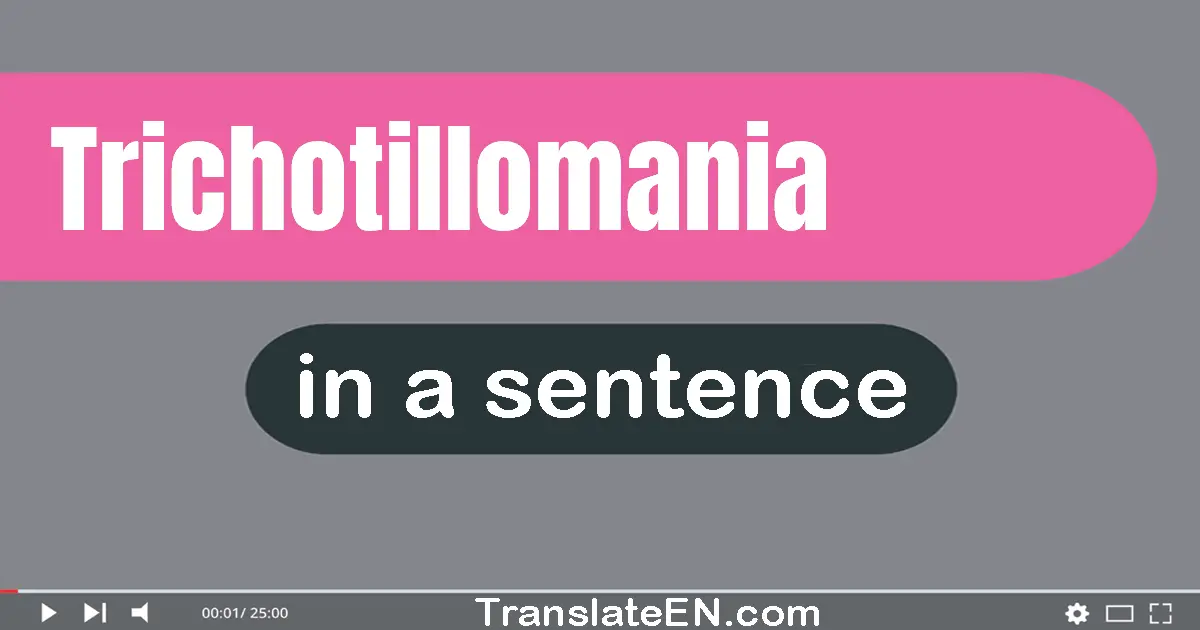Trichotillomania in a sentence
Meaning: A mental disorder characterized by compulsively pulling out one's hair.

(1) The exact cause of trichotillomania is still unknown.
(2) Trichotillomania can affect people of all ages and genders.
(3) Trichotillomania is classified as an impulse control disorder.
(4) Trichotillomania may be triggered by stress or certain situations.
(5) Trichotillomania is not a result of laziness or lack of willpower.
(6) Trichotillomania can lead to noticeable hair loss and bald patches.
(7) Fidgets can be a helpful tool for individuals with trichotillomania.
(8) Treatment options for trichotillomania include therapy and medication.
(9) My friend wants to be a counselor to individuals with trichotillomania.
(10) People with trichotillomania may experience hair loss and bald patches.
Trichotillomania sentence
(11) Cognitive-behavioral therapy is commonly used to treat trichotillomania.
(12) Trichotillomania is a hair-pulling disorder that affects many individuals.
(13) The psychologist found him certifiable on account of his trichotillomania.
(14) Trichotillomania can be a chronic condition that requires ongoing management.
(15) It is important for individuals with trichotillomania to seek professional help.
(16) Trichotillomania is a disorder characterized by the urge to pull out one's hair.
(17) People with trichotillomania often struggle with the urge to pull out their hair.
(18) Early intervention and treatment can help prevent trichotillomania from worsening.
(19) Family support and understanding are crucial for individuals with trichotillomania.
(20) Support groups can provide valuable resources for individuals with trichotillomania.
Trichotillomania make sentence
(21) Trichotillomania can lead to complications such as skin infections or ingrown hairs.
(22) Individuals with trichotillomania may experience feelings of shame and embarrassment.
(23) Individuals with trichotillomania may use various techniques to hide their hair loss.
(24) Treatment for trichotillomania may include therapy, medication, or a combination of both.
(25) Trichotillomania can also lead to other complications, such as skin damage or infections.
(26) Trichobezoar is more common in individuals with trichotillomania, a hair-pulling disorder.
(27) Trichotillomania is often a coping mechanism for dealing with stress or emotional distress.
(28) The stigma surrounding trichotillomania can make it difficult for individuals to seek help.
(29) The exact cause of trichotillomania is unknown, but it may be related to anxiety or stress.
(30) People with trichotillomania may feel embarrassed or ashamed of their hair pulling behavior.
Sentence of trichotillomania
(31) Trichotillomania can have a significant impact on a person's self-esteem and quality of life.
(32) The constant hair-twirling is a common form of stereotypy in individuals with trichotillomania.
(33) The impact of trichotillomania on relationships and social interactions should not be underestimated.
(34) The doctor recommended therapy to address the underlying trichotillomania that led to the trichobezoar.
(35) Trichotillomania is a serious disorder that can have a significant impact on a person's quality of life.
(36) Education and awareness about trichotillomania are essential to reduce misconceptions and promote empathy.
(37) Trichotillomania can be a difficult disorder to manage, but with proper treatment, it is possible to overcome.
(38) It is important for friends and family to offer support and understanding to individuals with trichotillomania.
(39) It is important for individuals with trichotillomania to seek professional help if they are struggling to control their hair pulling.
Trichotillomania meaning
Trichotillomania is a complex disorder characterized by the irresistible urge to pull out one's hair, resulting in noticeable hair loss. If you are looking to incorporate the word "trichotillomania" or the phrase "suffering from trichotillomania" into your sentences, here are some tips to help you do so effectively:
1. Define the term: When introducing the word "trichotillomania" in a sentence, it is essential to provide a brief definition or explanation of the disorder.
For example, "Trichotillomania, also known as hair-pulling disorder, is a psychological condition where individuals have an uncontrollable urge to pull out their hair."
2. Use it in a clinical context: Trichotillomania is a recognized mental health disorder, so incorporating it into a sentence within a clinical or psychological context can be appropriate. For instance, "The therapist diagnosed her with trichotillomania after observing her hair-pulling behavior during the session."
3. Discuss symptoms and effects: To provide a comprehensive understanding of trichotillomania, it is helpful to mention the symptoms and effects associated with the disorder.
For example, "People suffering from trichotillomania often experience feelings of tension before pulling out their hair and a sense of relief or gratification afterward."
4. Highlight the emotional impact: Trichotillomania can have a significant emotional impact on individuals, so incorporating this aspect into your sentence can add depth. For instance, "Living with trichotillomania can be emotionally distressing, as individuals often feel ashamed, embarrassed, or anxious about their hair-pulling behavior."
5. Discuss treatment options: When discussing trichotillomania, it is essential to mention the available treatment options. This can help provide a sense of hope and support for individuals dealing with the disorder.
For example, "Cognitive-behavioral therapy and medication are commonly used to treat trichotillomania and help individuals manage their hair-pulling urges."
6. Share personal experiences or stories: Including personal experiences or stories related to trichotillomania can make your sentence more relatable and engaging. For instance, "She bravely shared her journey of overcoming trichotillomania, inspiring others to seek help and support."
7. Raise awareness: Incorporating the word or phrase into a sentence that aims to raise awareness about trichotillomania can be impactful.
For example, "By educating ourselves and others about trichotillomania, we can reduce the stigma surrounding this often misunderstood disorder." Remember, when using the word "trichotillomania" or the phrase "suffering from trichotillomania" in a sentence, it is crucial to be sensitive and respectful towards individuals who may be dealing with the disorder.
The word usage examples above have been gathered from various sources to reflect current and historical usage of the word Trichotillomania. They do not represent the opinions of TranslateEN.com.
